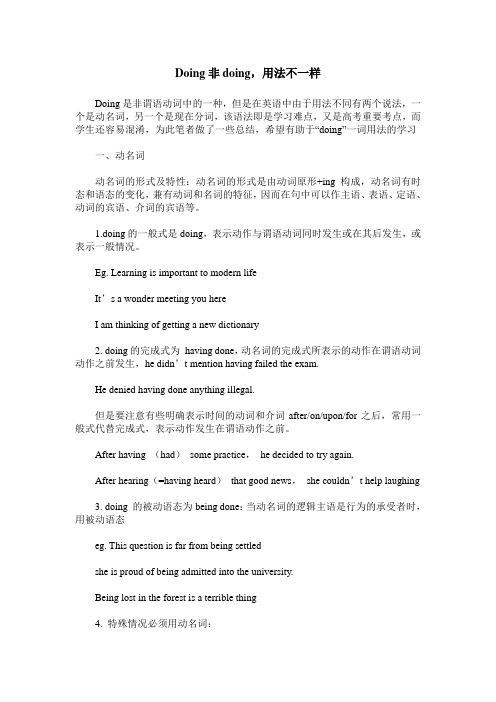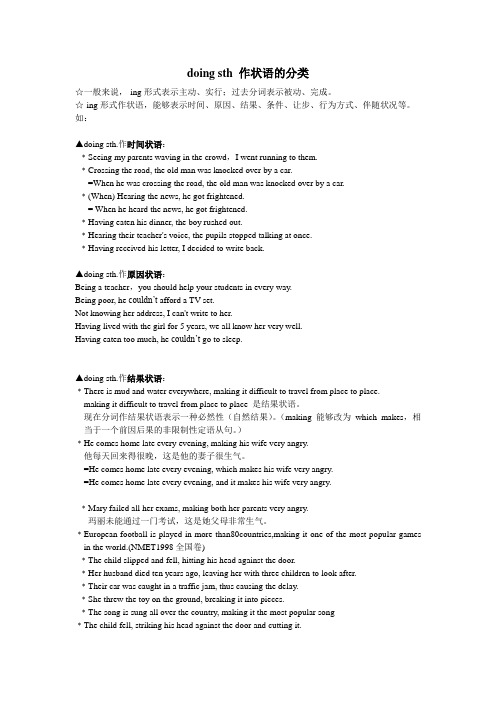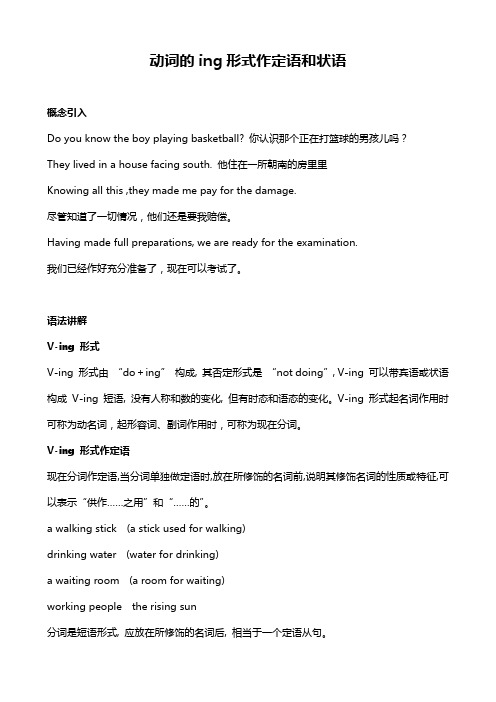doing 作定语和状语
Doing非doing,用法不一样

Doing非doing,用法不一样Doing是非谓语动词中的一种,但是在英语中由于用法不同有两个说法,一个是动名词,另一个是现在分词,该语法即是学习难点,又是高考重要考点,而学生还容易混淆,为此笔者做了一些总结,希望有助于“doing”一词用法的学习一、动名词动名词的形式及特性:动名词的形式是由动词原形+ing 构成,动名词有时态和语态的变化,兼有动词和名词的特征,因而在句中可以作主语、表语、定语、动词的宾语、介词的宾语等。
1.doing的一般式是doing,表示动作与谓语动词同时发生或在其后发生,或表示一般情况。
Eg. Learning is important to modern lifeIt’s a wonder meeting you hereI am thinking of getting a new dictionary2. doing的完成式为having done,动名词的完成式所表示的动作在谓语动词动作之前发生,he didn’t mention having failed the exam.He denied having done anything illegal.但是要注意有些明确表示时间的动词和介词after/on/upon/for之后,常用一般式代替完成式,表示动作发生在谓语动作之前。
After having (had)some practice,he decided to try again.After hearing(=having heard)that good news,she couldn’t help laughing3. doing 的被动语态为being done:当动名词的逻辑主语是行为的承受者时,用被动语态eg. This question is far from being settledshe is proud of being admitted into the university.Being lost in the forest is a terrible thing4. 特殊情况必须用动名词:1)动名词做宾语:有些动词或短语动词后常用动名词作宾语。
非谓语动词doing的用法总结

非谓语动词doing的用法总结
非谓语动词doing的用法总结如下:
1. 做主语:Doing exercises regularly helps improve physical fitness.
经常做运动有助于提高身体健康。
2. 做宾语:I enjoy doing yoga.
我喜欢做瑜伽。
3. 做定语:A living room is a place for doing various activities.
客厅是进行各种活动的地方。
4. 做补语:He kept on doing the same mistake.
他一直在犯着同样的错误。
5. 做状语:She left, doing her best to hide her tears.
她离开时,竭尽全力掩饰自己的眼泪。
6. 做同位语:Her favorite hobby, doing crossword puzzles, keeps her mind sharp.
她最喜欢的爱好——填字游戏,使她的头脑保持敏锐。
7. 做宾语补足语:We found him sitting alone in the park.
我们发现他独自坐在公园里。
总结:非谓语动词doing可以在句子中充当主语、宾语、定语、补语、状语、同位语以及宾语补足语的角色。
doing用法大全

being caught 精品资料
动名词可与介词一起构成介词短语。 A. 介词+动名词, 如: 我们得想些法子改变人们的习惯。 We’ve got to think of ways of changing people’s habits. 我向你道歉, 刚才对你那样生气。 I apologize for being so angry with you. 离开几年之后再回到你的家乡, 感觉(gǎnjué)有点怪。 After being away for several years, it is a strange experience to return to the hometown. B. 动词+介词+动名词, 如: 我坚持为这次出行带足需要的食物。 I insist on taking enough food for this trip.
精品资料
归纳: 常用-ing形式作主语的句型(jù xínɡ)有: It +be +a waste of time doing
做……是浪费时间的 It is/was no good/use doing
做……是没用处的 It is/was hardly/scarcely worth doing
做……不值得 It is/was worth/worthwhile doing
一个英语句子是由主谓宾构成的。通常情况下,主语和宾语通 常是由名称或代词充当的。当主语和宾语变成了动词,用法是 主动的必须(bìxū)用doing,被动的必须(bìxū)用being done . 也可用one’s doing 或one’s being done .否定时not必须 (bìxū)放在doing 之前。
doing作状语

doing作状语1.用法:动词ing作状语时,可以表示时间、原因、结果、条件、方式或伴随动作。
通常可转化成与之相对应的状语从句。
2.分类:(1)作时间状语e.g. Walking in the park, she saw an old friend.= When/While (she was) walking in the park, she saw an old friend.Having finished the work, he went to see his teacher.= After he had finished the work, he went to see his teacher.(2)作原因状语e.g. Being too young, he couldn't join the army.= As he was too young, he couldn't join the army.Not knowing how to get there, I had to ask the way.= As I did not know how to get there, I had to ask the way.(3)作条件状语e.g. Working hard, you'll make great progress.= If you work hard, you'll make great progress.(4)作结果状语e.g. His parents died, leaving him an orphan.= His parents died and left him an orphan.The snow lasted a week, resulting in a serious traffic confusion in the whole area.=The snow lasted a week, and resulted in a serious trafficconfusion in the whole area.注意:动词ing形式与不定式均可作结果状语,区别是:动词ing 形式表示顺其自然、意料之中的结果,而不定式则表示不愿看到的、出人意料的结果。
doing sth 作状语的分类

doing sth 作状语的分类☆一般来说,-ing形式表示主动、实行;过去分词表示被动、完成。
☆-ing形式作状语,能够表示时间、原因、结果、条件、让步、行为方式、伴随状况等。
如:▲doing sth.作时间状语:﹡Seeing my parents waving in the crowd,I went running to them.﹡Crossing the road, the old man was knocked over by a car.=When he was crossing the road, the old man was knocked over by a car.﹡(When) Hearing the news, he got frightened.= When he heard the news, he got frightened.﹡Having eaten his dinner, the boy rushed out.﹡Hearing their teacher's voice, the pupils stopped talking at once.﹡Having received his letter, I decided to write back.▲doing sth.作原因状语:Being a teacher,you should help your students in every way.Being poor, he couldn’t afford a TV set.Not knowing her address, I can't write to her.Having lived with the girl for 5 years, we all know her very well.Having eaten too much, he couldn’t go to sleep.▲doing sth.作结果状语:﹡There is mud and water everywhere, making it difficult to travel from place to place.making it difficult to travel from place to place 是结果状语。
动词的ing形式作定语和状语

动词的ing形式作定语和状语概念引入Do you know the boy playing basketball? 你认识那个正在打篮球的男孩儿吗?They lived in a house facing south. 他住在一所朝南的房里里Knowing all this ,they made me pay for the damage.尽管知道了一切情况,他们还是要我赔偿。
Having made full preparations, we are ready for the examination.我们已经作好充分准备了,现在可以考试了。
语法讲解V-ing 形式V-ing 形式由“do+ing”构成, 其否定形式是“not doing”, V-ing 可以带宾语或状语构成V-ing 短语, 没有人称和数的变化, 但有时态和语态的变化。
V-ing 形式起名词作用时可称为动名词,起形容词、副词作用时,可称为现在分词。
V-ing 形式作定语现在分词作定语,当分词单独做定语时,放在所修饰的名词前,说明其修饰名词的性质或特征,可以表示“供作……之用”和“……的”。
a walking stick (a stick used for walking)drinking water (water for drinking)a waiting room (a room for waiting)working people the rising sun分词是短语形式, 应放在所修饰的名词后, 相当于一个定语从句。
They are visitors coming from several countries.who come from several countries.Three days later I received a letter offering me the job.which offered me the job.The girl standing there is my classmate.who stands there现在分词作状语现在分词作状语时, 分词的逻辑主语必须是句子的主语, 分词必须和句中的主语含有逻辑上的主谓关系, 否则不能用现在分词作状语。
周五语法4动词ing形式用法

5. 作宾补: 现在分词作宾补表示正在发生的动
作,动词和宾语之间构成逻辑上的主谓关系,表 示主动含义。接分词作宾补的动词有:
①feel, hear, see, watch, observe, notice, find, smell, + sb./ sth. doing 表示该动作正在进行
eg.
I saw him going upstairs.
他沦为沿街乞。
• be attached to附属于,爱慕,爱恋,敬仰
• be adjusted to/ adjust to/ adjust oneself to适应
• be adapted to/ ade sentenced to被判处
• be exposed to 暴露于/遭受/接触…
仅 需 了
• She has taken to drinking recently. 解
他最近喜欢喝酒。
• fall to 开始
After supper we fell to discussing politics.
晚饭后我们开始讨论政治。
• respond to回答
3. 作表语
eg. His favorite sport is hiking. 他最喜欢的运动是徒步旅行。 My job is playing all kinds of instruments. 我的工作是演奏各种乐器。
⑶在 there be 结构中作主语,例如:
no no sense in(没有道理) There be+ no point in(毫无意义) +V-ing no use in
eg. There was no knowing when he would leave. 无法知道他什么时候离开。
doing作状语

条件状语从句与doing的转换
要点一
如果条件状语从句中主语与主句 主语一致,且含有情态动词或…
“If you come early, you will see him.” 可转换为 “Coming early, you will see him.”
表示导致结果的原因
动词-ing形式还可以表示导致某种结果的原因,强调动作与 结果之间的因果关系。
表示条件
相当于if引导的条件状语从句
动词-ing形式可以表示条件,相当于if引导的条件状语从句的简化形式。
表示假设条件
动词-ing形式也可以表示假设条件,即某个动作或状态如果发生或存在,将会 导致什么样的结果。
Although raining heavily, they still went out.(尽管雨下得很大,他们还是出去了。 )
过去分词作状语
表示时间
Once seen, it can never be forgotten.(一旦看到,就永远不会忘 记。)
表示条件
Given more time, we could have done it better.(如果给我们更 多的时间,我们可以做得更好。)
02
动词-ing形式作状语
表示时间
与谓语动词同时发生
动词-ing形式可以表示与谓语动词同 时发生的动作或状态,相当于一个时 间状语从句。
发生在谓语动词之前
动词-ing形式也可以表示发生在谓语 动词之前的动作,相当于一个时间状 语从句的简化形式。
- 1、下载文档前请自行甄别文档内容的完整性,平台不提供额外的编辑、内容补充、找答案等附加服务。
- 2、"仅部分预览"的文档,不可在线预览部分如存在完整性等问题,可反馈申请退款(可完整预览的文档不适用该条件!)。
- 3、如文档侵犯您的权益,请联系客服反馈,我们会尽快为您处理(人工客服工作时间:9:00-18:30)。
3. 用他的杂交水稻种子,农民们种出的粮食是以前的 两倍。 Using his hybrid rice, farmers are producing harvests twice as large as before.
1. After we had found a hotel, we began to look for a restaurant. Having found a hotel, we began to look for a restaurant.
2. Because we didn’t know her address, we couldn’t get in touch with her. Not knowing her address, we couldn’t get in touch with her.
3. As I hadn’t got an answer, I decided to write him another letter. Not having got an answer, I decided to write him another letter.
a. John hurt his leg while he was playing football. Playing football, John hurt his leg. While playing football, John hurt his leg. b. The man turned round from time to time as if he was searching for someone. The man turned round from time to time , searching for someone. The man turned round from time to time , as if searching for someone.
1. the moving hand = the hand which is moving 2. the developing countries = the countries which are developing 3. a sleeping man = a man who is sleeping 4. Do you know the woman who is talking to Jim? = the woman talking to Jim. 5. The village is made up of 490 families who belong to five nationalities. = families belonging to five … 6. They plan to build a highway which leads to the mountains. = a highway leading to the mountains
= Weighing almost one hundred kilos, the stone was … 4. Because he saw nobody at home, he decided to leave them a note. = Seeing nobody at home , he decided to leave them ...
1. the waiting area = the area which is used for waiting 2. the reading room = the room which is used for reading 3. a walking stick = a stick which is used for walking
1.I stood for a minute, watching them. 2.She stepped back, appearing surprised.
3.Akira came in, smiling.
4.They express their feelings using unspoken languoping country while America is a developed country.
1. 林把毕生精力投入到医学工作中,是一个妇科病专 家。 Devoting all her life to medical work , Lin was a specialist in women’s illnesses.
1.这是一本解释如何照顾婴儿的小书。
This is a small book explaining how to care for babies.
2.在那时,饥饿是一个令人烦恼的问题。
At that time, hunger was a disturbing problem .
3.中国是一个发展中国家,而美国是一个发达 国家。
4. 因为一直在农田耕种作研究,袁把自己当作是一名 农夫。 Working the land to do his research, Yuan considers himself a farmer.
5. 尽管出生于一个贫寒的农民家庭,袁毕业于西南农 业大学。 Born into a poor farmer’s family, Yuan graduated from Southwest Agricultural College. 6. 在观察猩猩日常生活多年以后,她完全理解了他们 的行为。 Having observed chimps’ daily activities for years, she fully understood their behavior. 7. 因为没有收到回信,他决定在写一封信。 Not having received the answer, he decided to write another letter.
5.Darlene came , dashing through the door.
1. When we heard the news, we all jumped with joy. = Hearing the news, we all jumped with joy. 2. If you work hard, you’ll certainly make your dream come true. = Working hard , you’ll certainly make your dream come true. 3. Although the stone weighed almost one hundred kilos, the stone was moved by the boy alone.
1. Unfortunately , his father died , leaving the family even worse off. 2. Peas and soybeans put important minerals back into the soil, making it ready for wheat. 1. Akira came in, smiling. 2. Following Tom, we started to climb. _________ Followed by Tom , we started to climb
